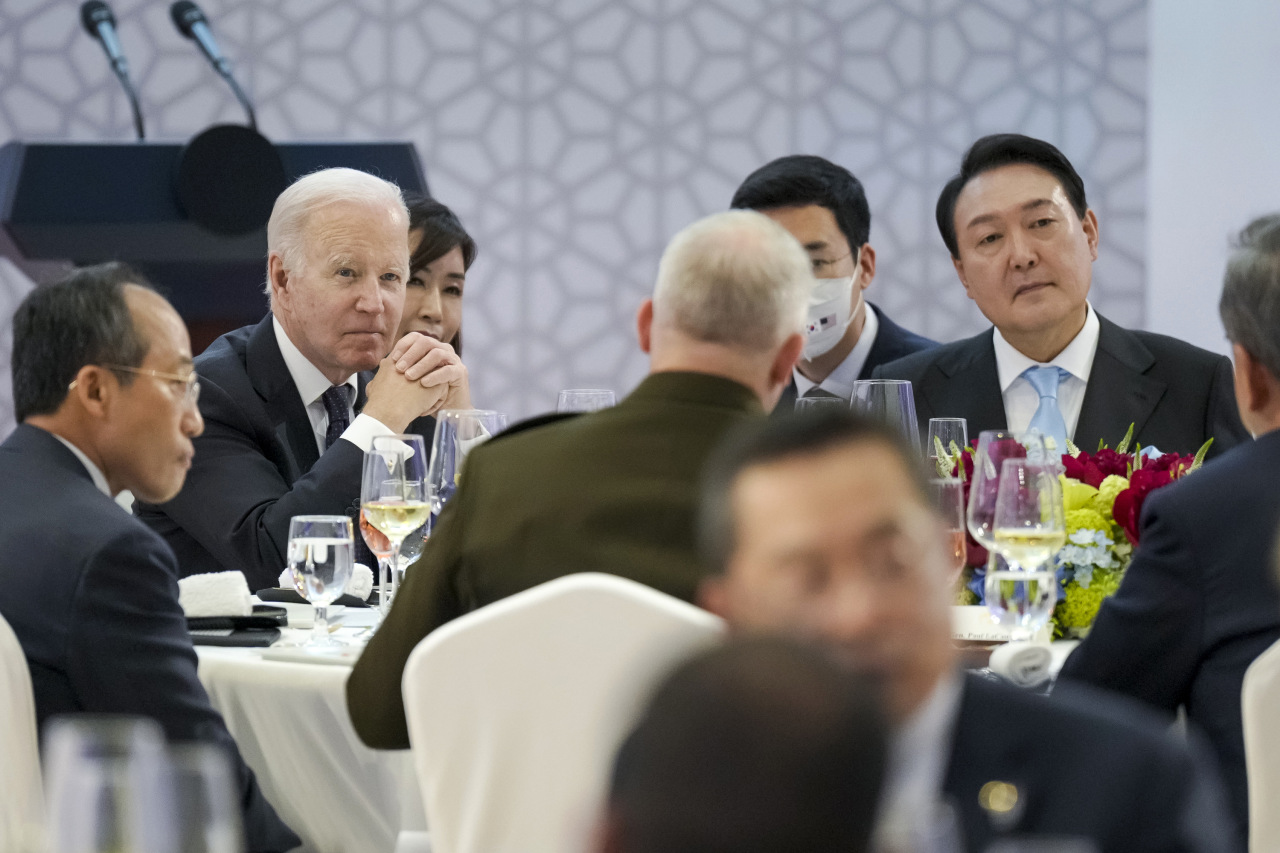South Korea and the United States said Tuesday they had been discussing the joint operation of US nuclear assets to enhance the alliance’s capabilities to counter North Korean threats, clarifying that an option to stage nuclear exercises was off the table.
The presidential office in Seoul confirmed hours after US President Joe Biden flatly denied a White House reporter question whether he was “discussing joint nuclear exercises with South Korea right now.”
But the White House later also confirmed that the allies have been discussing plans including table-top exercise, or TTX, in the not-too-distant future, but not a nuclear exercise as Seoul is not a nuclear power.
Biden’s denial on the question — which had been asked straightforwardly without providing proper context, stirred controversy for hours on whether Seoul and Washington are on the same page.
“South Korea and the US have been in discussion over information sharing and joint planning on the operation of US-owned nuclear assets as well as joint execution of them accordingly to counter North Korean nuclear weapons,” Kim Eun-hye, senior presidential secretary for press affairs, said in a written statement.
Biden appears to have had no option but to say no as he was asked without any further explanations, Kim said, adding that only nuclear weapon states can stage “joint nuclear exercises.”
Yoon said in an interview published on Monday that South Korea is “now discussing with the US over the concept of ‘joint planning and combined exercises’ on nuclear assets to effectively enhance extended deterrence.”
“The US is very affirmative about it,” Yoon said. “Nuclear weapons belong to the US, but South Korea and the US should work together on planning, intelligence sharing, training and exercises. In the sense that South Korea and the US jointly engage in (the procedures), we’ve made great advances compared to the previous concept of extended deterrence.”
Two senior South Korean government officials — who wished to remain anonymous and are directly engaged in talks with the US — said an option to stage nuclear exercises has not been an agenda topic for the ongoing bilateral discussion in phone calls with The Korea Herald on Tuesday.
NATO and the US, for instance, have staged nuclear exercises, including Steadfast Noon aimed at mastering NATO’s nuclear strike mission with nuclear-capable aircraft and US tactical nuclear weapons.
Instead, South Korea and the US have been in talks over how the South Korean military can better support the US nuclear operations on the Korean Peninsula with its conventional military forces, one South Korean government official told The Korea Herald. The bilateral discussion focuses on how the South Korean military backs up the operation of US strategic bombers on the peninsula.
In addition, the South Korean and US defense chiefs have already agreed to stage a TTX annually at the Security Consultative Meeting in November.
A TTX is a computer-based simulation exercise and it’s not an outdoor field training exercise, FTX. But a TTX allows South Korea and the US to practice joint military responses in simulated contingency scenarios, including North Korean nuclear threats and the use of nuclear weapons. The two countries have staged a TTX only twice since 2018 including the last one in September 2021.
South Korea’s Defense Ministry also reiterated that Yoon’s comments are in line with the bilateral agreement at the defense ministerial-level SCM.
The allies agreed to “strengthen cooperation in each area, including information sharing, consultation process as well as joint planning and execution,” to strengthen the alliance’s capability to deter and respond to North Korean nuclear and missile threats, Jeon Ha-gyu told a regular press briefing.
“Our military has been discussing various ways to enhance the viability of the (US) extended deterrence in close coordination with the US accordingly,” Jeon said, declining to share further details about the ongoing discussion.
Seoul and Washington agreed to institutionalize a four-step specific mechanism — which consists of information sharing and consultation on North Korean threats and strategy planning and execution — to enhance the viability of the US extended deterrence against North Korean threats after months of discussion. Extended deterrence is the US commitment to deter or respond to coercion and attacks on US allies and partners. The “US nuclear umbrella” is one means the US offers to achieve extended deterrence.
By Ji Da-gyum (
dagyumji@heraldcorp.com)








